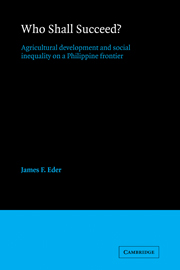Book contents
- Frontmatter
- Contents
- List of tables, figures, and maps
- Preface
- 1 Introduction
- 2 Rich man, poor man: life in a frontier farming community
- 3 The economic and social origins of the migrant farmers
- 4 Eight migrants
- 5 The origins of social inequality
- 6 The maintenance of social inequality: earning a living
- 7 The maintenance of social inequality: earning prestige
- 8 The perpetuation of social inequality?
- 9 Conclusion
- Appendixes
- Notes
- Bibliography
- Index
- Frontmatter
- Contents
- List of tables, figures, and maps
- Preface
- 1 Introduction
- 2 Rich man, poor man: life in a frontier farming community
- 3 The economic and social origins of the migrant farmers
- 4 Eight migrants
- 5 The origins of social inequality
- 6 The maintenance of social inequality: earning a living
- 7 The maintenance of social inequality: earning prestige
- 8 The perpetuation of social inequality?
- 9 Conclusion
- Appendixes
- Notes
- Bibliography
- Index
Summary
The migrant farmers who left Cuyo Island for San Jose shared one central characteristic: They left voluntarily in the expectation of achieving a better way of life. Beyond this, and notwithstanding their seemingly homogeneous social origins, they differed considerably in ability and motivation, and in ways that would powerfully influence their responses to the changing opportunities on the frontier. This chapter concerns the responses and experiences of eight such migrant farmers. Four were conspicuously successful in meeting the challenges and opportunities of the new order and are today all in the upper status group. The other four migrants were conspicuous failures. They did not significantly change or improve their material well-being over what it had been in Cuyo and are today all in the lower status group.
Such migrants were “failures,” of course, only in terms of economic performance; they may well have achieved other kinds of satisfactions on the frontier, satisfactions that the economically successful did not achieve or perhaps even seek. If the stories of the failed migrants are shorter here, it is only because our concern is with economic achievement, and there is simply more to be said about those whose economic lives changed a great deal between Cuyo and San Jose than about those whose lives did not. I have chosen the stories of these particular eight men for discussion because each illustrates, in particularly dramatic fashion, some of the environmental conditions and personal characteristics that contributed to the emergence and growth of social inequality.
- Type
- Chapter
- Information
- Who Shall Succeed?Agricultural Development and Social Inequality on a Philippine Frontier, pp. 46 - 71Publisher: Cambridge University PressPrint publication year: 1982

